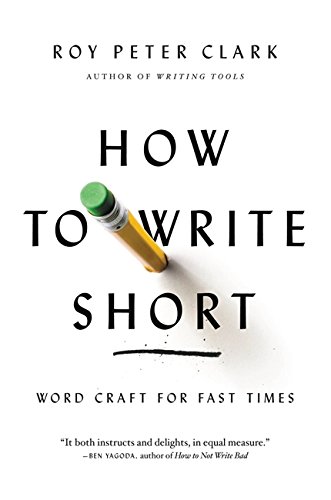
How to Write Short
Word Craft for Fast Times
کتاب های مرتبط
- اطلاعات
- نقد و بررسی
- دیدگاه کاربران
نقد و بررسی

June 15, 2013
A veteran writing teacher at the Poynter Institute returns with some ideas that writers can learn from the short forms that now proliferate--from tweets to text messages to bathroom scrawls (really). Clark's (Help! For Writers: 210 Solutions to the Problems Every Writer Faces, 2011, etc.) text resembles just about any other in the self-help genre: short, snappy chapters (and sentences and paragraphs), lists (bulleted and otherwise) and end-of-the-chapter suggestions for additional activities (he calls these "Grace Notes"). The advice he offers is a mixture of the traditional and the novel. He suggests aspiring writers should keep a commonplace book filled with examples of short-and-effective writing gleaned from our contemporary short-form environment. His thesis is patent: If writers desire to write long, they should "begin by writing short." Clark spends the majority of the book examining various places where short texts occur and explaining how writers can, and should, benefit from them. His sources are in some cases surprising, sometimes not: baseball cards, book blurbs, marginalia, blogs, Zach Galifianakis-like quips, haiku, single-sentence stories, T-shirt slogans and profiles composed for online dating sites. Among the most unusual are text messages sent during a psycho's armed attack in Norway. Clark offers some more literary examples, as well, ranging from an Updike paragraph to the Gettysburg Address and the writings of Samuel Johnson. The "Grace Note" sections are generally unremarkable, with suggestions ranging from, "Write a brief premise for a movie" to, "Spend time and energy on titles and headlines." He advises writers to learn different ways to form lists in a text, then closes with some warnings about the power of short writing to harm as well as benefit (Orwell and Huxley appear here). Writers can surely benefit from practicing some of these tiny techniques, but voracious reading, writing, traveling, thinking and feeling can help even more.
COPYRIGHT(2013) Kirkus Reviews, ALL RIGHTS RESERVED.

September 1, 2013
Though the topic of this writing guide is inarguably relevant, author Clark (writing, Poynter Inst. for Media Studies; Writing Tools) has created a bit of a conundrum in his latest work. Discussing very short forms of writing in a full-length book may appeal to die-hard wordsmiths, but at least a portion of this title's intended audience are not likely to make contact owing to its traditional medium. The chapters, all 35 of them, are quite short, however, most of them spanning only a couple of pages and closing with tips and exercises ("Grace Notes"). The text touches on almost every form of microwriting imaginable, from tweets to tattoos, and offers advice for strengthening even the most succinct prose. Clark's instruction is solid and based on many years of experience in journalism and the wider writing world. The tone is appropriately light, and the plentiful examples are informative as well as entertaining. Most of the principles Clark espouses here could be both applied to writing of any length and extrapolated from any number of other general writing guides. VERDICT The niche focus of this book will give it appeal to writing teachers and anyone interested in writing for the web and/or social media. [See Prepub Alert, 2/25/13.]--Stacey Rae Brownlie, Harrisburg Area Community Coll. Lib., Lancaster, PA
Copyright 2013 Library Journal, LLC Used with permission.

























دیدگاه کاربران